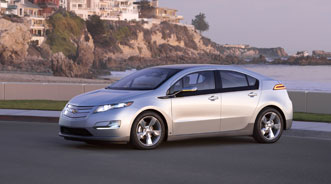Automakers to Accelerate EV Race, But KPMG Finds Lag in Demand

By subscribing, you agree to receive communications from Auto Remarketing and our partners in accordance with our Privacy Policy. We may share your information with select partners and sponsors who may contact you about their products and services. You may unsubscribe at any time.
DETROIT –
In a heated race to the top of technological innovation, automakers have already pumped significant investments into electric propulsion technology, and an overwhelming majority of global auto executives believe car companies will only ramp up these investments in the next two years as the competition intensifies.
But in a market where the infrastructure has for so long been a gas-powered engine, will the electrified vehicle actually gain a major foothold?
Interestingly enough, the execs participating in 13th annual global automotive survey from KPMG believe the demand for these vehicles will continue to run only at “modest” levels.
In fact, 65 percent of the 200 C-level global auto execs surveyed said they don’t believe electrified vehicles (i.e. electric vehicles of any kind, including everything from full hybrids to FCEVs) will command more than a 15-percent share of worldwide car sales within the next 13 years.
What’s more, U.S. and Western Europe auto executives believe these models will only command a worldwide sales share between 6 percent and 10 percent.
“Electric vehicles are still in their infancy, and while we’ve seen some recent model introductions, consumer demand has so far been modest,” stated KPMG national automotive industry leader Gary Silberg.
Subscribe to Auto Remarketing to stay informed and stay ahead.
By subscribing, you agree to receive communications from Auto Remarketing and our partners in accordance with our Privacy Policy. We may share your information with select partners and sponsors who may contact you about their products and services. You may unsubscribe at any time.
“While we can expect no more than modest demand in the foreseeable future, we can also expect OEMs to intensify investment, fully appreciating what is at stake in a very competitive industry,” he added.
In other words, demand might not yet be there, but you can still expect the investment floodgates to open.
For example, 83 percent of respondents project an uptick in e-motor production investment over the next two years by automakers. Meanwhile, 81 percent of executives said they believe automakers will pump more money into battery (pack/cell) technology, and 76 percent project an investment boost in power electronics for electrified cars.
About two thirds (65 percent) forecast more investment in fuel cell (hydrogen) technology.
In the next five years, the alternative propulsion technologies that automakers are expected to invest most heavily in are hybrid fuel systems, hybrid fuel systems, battery electric power and fuel cell electric power.
“What’s interesting is that automakers are placing bets across the board, and large bets at that, because no one knows which technology will ultimately win the day with consumers,” Silberg noted.
“In last year’s KPMG survey, executives told us it would be more than five years before the industry is able to offer an electric vehicle that is as affordable as traditional fuel vehicles for mainstream buyers,” he continued.
“It will be interesting to see how consumer adoption progresses as automakers discover ways to offer these electrified cars at better price points and the infrastructure for these vehicles becomes more robust and accommodating,” Silberg added.
That said, 61 percent of executives believe that optimization of internal combustion engines is more efficient compared to any electric vehicle technology and cuts out more carbon-dioxide emissions.
Which Technology Will Reign?
As far as the specific technologies forecasted to entice consumers the most, there was a great deal of parity among executive expectations.
More specifically, 20 percent said fuel cell electric vehicles will bring in the most demand between now and 2025, while 16 percent pointed to battery-electrified vehicles. Twenty-two percent favored full hybrids, and 21 percent believed plug-in hybrids will generate the most interest. Lastly, 18 percent projected the most popular will be battery electrified vehicles with range extenders.
"The industry faces a tough decision about whether to place more trust and resources in fuel cell or battery vehicle concepts, and these results show that it’s way too early to call right now,” Silberg noted.
“Clearly hybrids, whether plug-in or full, are more mature and have more market presence, but this battle for the dominant technology platform will continue for years to come,” he concluded.
Editor’s Note: Stay tuned for Part II of Auto Remarketing’s analysis of KPMG’s report, which will run on Monday.


